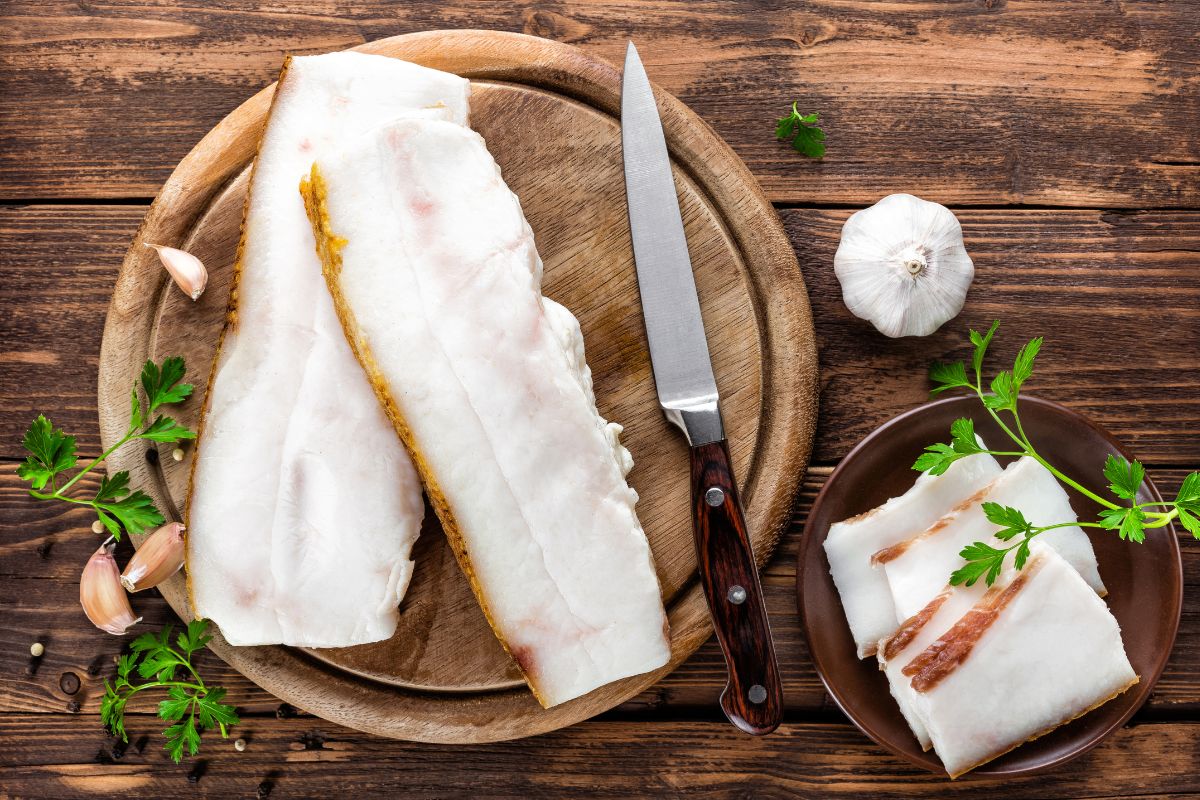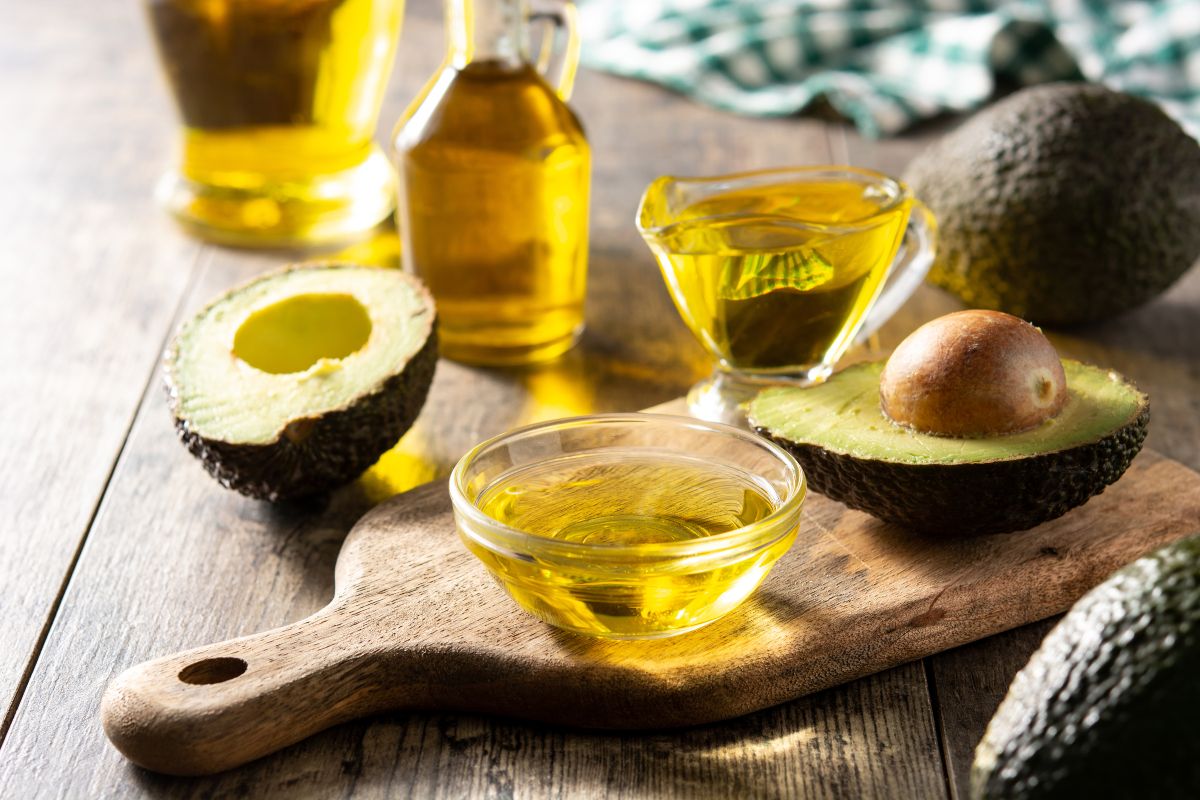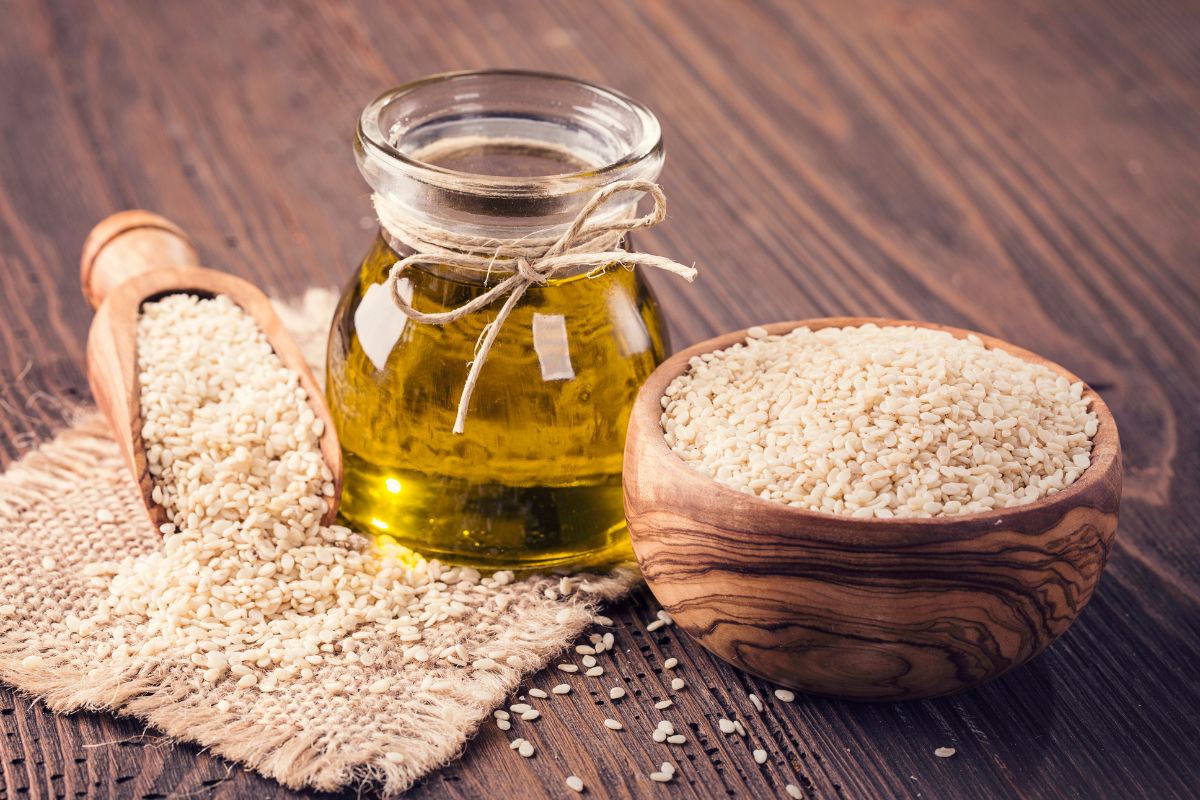What is Bacon Grease?
Simply put, bacon fat, commonly referred to as bacon drippings or bacon grease, is the fat found in bacon. Is there any substitute for bacon grease? When you cook bacon, a liquid fat breaks out, giving dishes a flavor-carrying fat.
Bacon grease is a flavor-carrying fat that makes food taste better and feels satiated. These factors contribute to the Southern U.S. preference for bacon drippings.
What Can I Use Instead of Bacon?
What is a good substitute for bacon? There are several bacon fat substitutes that you can use. They can either be animal fat substitutes or vegan substitutes for those who fancy plant-based diets. Let’s take a look.
Animal Fat Substitutes
Pork Lard
Lard and bacon fat have a connection because they are both pork fat; hence bacon fat is the ideal replacement. Although it is time-consuming, rendering lard at home is fairly simple and produces crispy crackling. (While ready-to-use lard is available in grocery stores, handmade lard is always preferable. If not, consider one of the lard alternatives.)
The main drawback is that ordinary hog fat lacks the salty, smoky flavor of bacon grease due to its neutral flavor, but you can easily make up for that by adding a dash of liquid smoke or smoked salt.

Chicken Skin Grease (Schmaltz)
You may render chicken oil from chicken skin like you extract bacon fat or swine lard. Schmaltz, a wonderful substitute for bacon fat, imparts a delectable flavor to dishes, like in this Singapore chicken congee (you also get the bonus of crispy chicken skin at the end—yum!).
Beef Fat (Beef Tallow)
Like swine lard, beef fat needs time to prepare before you can use it in baking and cooking. It is a belief that the key to the flavor of MacDonald’s french fries is beef fat. (although they’ve now converted to vegetable oil out of concern for saturated fat).
Duck Fat
You probably get the idea by now: if you cannot find bacon fat, fat produced from other animals works just as well as a substitute. Consider French duck confit if you don’t think duck fat is delicious.
Ghee
Like bacon drippings, ghee, an Indian clarified butter, gives food a tremendous flavor boost. It benefits from having a very high smoke point, which makes it ideal for deep frying. Unfortunately, ghee is not the healthiest option because it has 62% saturated fat.
Note: The ghee preparation differs from conventional clarified butter and tastes nuttier.

Butter
Because ghee has a greater smoke point than butter, It makes a better substitution for bacon fat. If you can’t find ghee, you can substitute butter, which gives food flavor and a little sweetness.
Don’t forget first to clarify the butter if you’re cooking at a high temperature. Beware that you can substitute bacon fat (or pork lard) for butter in some home baking recipes to create an even more delicate crumb.
Vegan Substitutes
These are several vegetarian substitutes for bacon fat options if you follow a plant-based diet. These vegetarian/meat-free dishes may be of interest to you:
Magic Vegan Bacon Grease
This is a manufactured good made in Canada from coconut oil, soy protein, maple syrup, pepper, onion, garlic, torula yeast, smoky flavoring, and sea salt,
Avocado Oil
Avocado oil is a thick fat similar to bacon grease, but it is not as flavorful; you might fix this by adding a dash of nutritional yeast, smoked sea salt, onion powder, and garlic powder.

Vegetable Shortening
Unfortunately, using shortening in place of bacon fat will result in the food having less taste. As a result, you might wish to cook with a little umami using the same ingredients as you would with avocado oil (or mushroom powder.)
Peanut Oil
Peanut oil is an inclusion on the list of top replacements for bacon grease. If you want to give your recipe some more taste, use this oil. Its fragrant flavor and nutty taste will win you over. You can use it to produce sauce and sauté meals.
Additionally, it works well in baking, marinades, and dips. You can create your homemade peanut oil if you have the chance. Just a friendly reminder: it burns quickly when heated over high heat.
Sesame Oil
If you’re creating Chinese food, this is one of the greatest vegan substitutes for bacon fat. Sesame oil functions similarly to bacon grease in cooking. It is one of the most adaptable substitutes available.
You can use it as a topping for pasta, rice, stews, soups, marinades, and desserts. Enjoy your recipe’s flavor and scent in equal amounts. Sesame oil can substitute for bacon fat if you want to sprinkle it on practically everything. In addition, sesame oil is a common ingredient in Asian cuisine.

Olive Oil
Olive oil is a great alternative to increase the nutritional value of your meals. It can also benefit your health in a variety of ways. Therefore, use olive oil instead of bacon fat if you want to go completely to a plant-based diet and don’t want to care about cholesterol.
Thanks to this perfect ingredient, every meal benefits from its great tenderness, marination, and texture after cooking. Olive oil has a delicate scent and a light tint. It is a good choice if you want your cuisine to stand out, especially spices and meats. You may use it for savory topping, salad dressing, or dip.
The Health Benefits
Meat often contains a wealth of essential nutrients that the body cannot naturally make but needs. Predators don’t need to eat Brazil nuts now and then to increase their selenium intake because they can subsist on an all-meat diet. You will find the following vital vitamins and minerals in bacon and are part of a balanced diet:
Protein
1.3 ounces (37 grams) of the 3.53 ounces (100 grams) in a regular supermarket serving of cooked bacon consists of animal protein. Almost all of your body’s cells depend on protein as a fundamental building element.
Your body utilizes protein to create anything from enzymes to new red blood cells, even though you may link muscle gain. Protein also works for hair, nails, and nearly all your internal organs.
Vitamin-Bs
B vitamins, including B1, B2, B3, B5, B6, and B12, are all in bacon. B-vitamin deficiencies can impair heart, liver, kidney, and brain function because they are essential for many of your body’s most intricate processes.
Numerous B-vitamins, including Biotin (B7), Pyridoxine (B6), and Niacin (B3), are essential for the digestion of lipids and carbohydrates. Others, like thiamin (vitamin B1) and folate (vitamin B9), are crucial components of intricate processes like DNA replication, cell division, and the production of neurotransmitters.
Selenium
Selenium is a crucial antioxidant and mineral that helps lower your risk of cancer and heart disease, strengthen your immune system, and maintain the health of your thyroid and brain.
Studies have suggested that selenium may lessen the need for repeated doses of the potentially hazardous corticosteroid drugs used to treat asthma because of its anti-inflammatory qualities and capacity to reduce oxidative stress on the lungs.
Phosphorus
Although it may seem strange that the body would require phosphorus, it makes up 1% of your body weight and is essential for developing bones and teeth.
Minerals
Iron, magnesium, zinc, and potassium are trace amounts in pork and, consequently, bacon. These metals are essential to several functions, including producing red blood cells, transporting oxygen, and controlling muscle and nerve activity.
Bacon is a Source of Omega 3s
The fatty acid omega 3 is most frequently linked to oily fish like mackerel, flaxseed, and almonds. Healthy Omega 3 dietary consumption can assist in lowering the risk of heart disease and stroke, as well as the signs and symptoms of rheumatoid arthritis and depression. A source of Omega 3 oils is bacon.
However, compared to Omega 3, modern pig feeding practices have considerably increased the amount of harmful Omega 6 in pork. Therefore, it is advisable to stick to fish oil if you’re searching for a good supply of omega-three fatty acids and enjoy the omega-three content of bacon as a bonus to your preferred pancake topping.
Eating Bacon Can Boost Your Mood
Considering how satisfying it is to eat bacon seems like a stretch of the imagination. There is, in fact, some scientific justification for this.
According to several studies, deficiencies in amino acids may either increase the symptoms of common mental diseases such as depression, bipolar disorder, schizophrenia, and obsessive-compulsive disorder (OCD), or they may be the root cause.
A common symptom of clinical depression is a deficiency in neurotransmitters such as serotonin, dopamine, noradrenaline, and gamma-aminobutyric acid. As a result of the fact that your body needs amino acids to generate these, eating foods rich in amino acids, such as bacon, can help alleviate the symptoms of depression as part of the larger therapy program.
You can only fully realize the health benefits of bacon when you consume it as part of a well-rounded meal plan; therefore, you should not consider it a panacea for mental illness.
Bacon Can Help With Food Cravings
Because it is heavy in fat, bacon can assist you in controlling your urge to eat unhealthy foods. No, bear with us here. The amount of fat included in bacon is the item that concerns the vast majority of people and will have a detrimental impact on their health.
Over half of the fats in bacon are monounsaturated, and it has a significant amount of oleic acid, which you may consider “heart-healthy.” The combination of high-fat and high protein content in food normally served in a modest portion can help you feel full after eating it, reducing the desire to consume more than you need to sustain yourself.
Bacon’s propensity to make you feel full and content despite eating a relatively small meal packed with fats and protein can make it the healthiest choice as part of a high-fat, low-carb diet. This is because bacon is rich in fats and protein.
Bacon is a Source of Choline – Which is Good for the Brain
Because choline, also known as phosphatidylcholine, is an essential nutrient, you must consume it in your diet to absorb it rather than produce it. Meat and eggs traditionally contain choline.
According to a recent study from the University of Eastern Finland, choline may play a crucial part in preventing dementia and Alzheimer’s disease, as well as the cognitive loss that comes with aging, because you can use it to make the neurotransmitter acetylcholine.
A healthy intake of choline, through foods like bacon, could also contribute to better memory and faster cognition speeds and keep your brain healthier for longer.
According to a study of about 2,500 Finnish men, “the risk of dementia was 28% lower in men with the highest intake of dietary phosphatidylcholine when compared to men with the lowest intake.”
Making and Storing Back Bacon Fat
The greatest bacon grease is homemade; it is available in grocery shops. Cook your bacon slowly over low to medium heat to create a flavorful liquid that you can use for baking and cooking.
Naturally, if you only cook a few strips of bacon, there may not be enough bacon fat to save; nevertheless, you can sauté mushrooms or toast bread in the same pan to use the remains of that liquid gold. (It is semi-solid at room temperature.) You can keep the extra drained bacon grease for later use when you fry more bacon.
Allow it to cool, filter it, and put it in an airtight container to keep in the fridge or freezer for two to three months. If you don’t strain, the bacon bits left inside will cause the bacon fat to spoil more quickly (before, cold, dark places at room temperature were in use to keep bacon fat.)
Using Bacon Grease and Its Substitutes
Some ways to use bacon fat or bacon substitutes for cooking include:
Roast Vegetables
Put some bacon fat in the pan instead of sprinkling your vegetables with olive oil before roasting. Once the bacon grease has melted, take the pan out of the oven and give it a good stir.
Fry Burgers
If you’re pan-frying them, you can season your burgers with a little bacon fat in the skillet.
Fry grilled cheese. Instead of using butter, try cooking your grilled cheese in bacon grease for an out-of-this-worldly wonderful sandwich!
Biscuits
You can use bacon grease instead of half the butter in your preferred biscuit recipe because it solidifies when cold.
Spread
Try coating your pizza dough with bacon grease before adding toppings to give it flavor and a crispy texture!
Spread on BLT Toast
To improve the bacon flavor while cooking a bacon, lettuce, and tomato, preserve some of the bacon greases and put it on warm bread in place of butter.
Baconnaise
Use my mayonnaise-making technique, but swap out some or all of the oil for melted bacon grease. You won’t be sorry!
Savory Scones
Meseidy’s recipe for Bacon Cheddar Scones utilizes bacon fat, which you will definitely love. Other savory scone recipes also allow you to substitute solid bacon grease for some of the butter.
Season Cast Iron
Dry your cast iron on the stove over medium heat after washing it. Add some bacon grease while the pan is still hot, then rub it in with a paper towel or special cast iron cloth.
Fry Eggs
My father taught me this trick: When frying eggs, add some bacon grease for wonderful flavor, but also some butter to prevent the egg from sticking. Although it’s not certain if it makes the butter more non-stick, my dad always did it.
Mashed Potatoes
Add some bacon fat to your mashed potatoes; loaded baked potato mashed potatoes would benefit especially from this!
Fried Rice
Try frying your fried rice in bacon fat the next time you prepare it! This is fantastic for fried rice for breakfast.
Pie Crust
You can use bacon fat instead of some butter to give a pie crust a savourier flavor. In your recipe for Sourdough Pie Crust, this is fantastic. Delicious for pot pies!
Soup base
Use the bacon fat to sauté the vegetables for your soup or to prepare the roux that will serve as the soup’s basis. This would be ideal for soup with potatoes and bacon!
Summary
For meals that benefit from its distinctive flavor, bacon grease is perfect. Fortunately, there are several bacon flavor substitutes you may use when cooking to make up for its lack. Try peanut oil if you want something to make your food taste better.
Butter or lard might be a good choice if you want something to enhance flavor. Olive oil, on the other hand, can enhance foods’ richness and depth without drastically changing their flavors. Try each alternative independently to determine which is most effective for whatever food you create.

Community of passionate writers and content creators who share a love for Italian heritage, culture, travel, food, and the Italian-American community. Our mission is to celebrate Italy’s rich history and traditions and connect with others who share the same passion.

